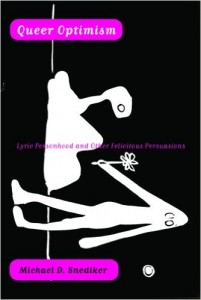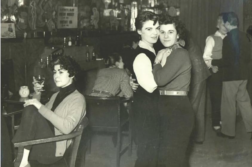 Queer Optimism: Lyric Personhood and Other Felicitous Persuasions
Queer Optimism: Lyric Personhood and Other Felicitous Persuasions
by Michael D. Snediker
University of Minnesota Press. 273 pages, $25. (paper)
QUEER THEORY has been criticized on a number of grounds, notably for its difficult language and abstruse categories; in Queer Optimism, Michael D. Snediker charges queer theory with a pervasive negativity and pessimism, a mood that causes its practitioners to focus most of their attention and analysis upon negative emotions rather than affirmative ones. The major players in queer theory—Judith Butler, Leo Bersani, Lee Edelman, and the late Eve Kosofsky Sedgwick—are all thoroughly explored in the book’s provocative and dense introduction. Snediker observes that “[m]elancholy, self-shattering, shame, the death drive: these, within queer theory, are categories to conjure with.” In critiquing this disposition in queer theory, he asks, both simply and complexly, why pessimism has predominated to date and whether a queer optimism can take hold and afford readers and critics a new perspective.







